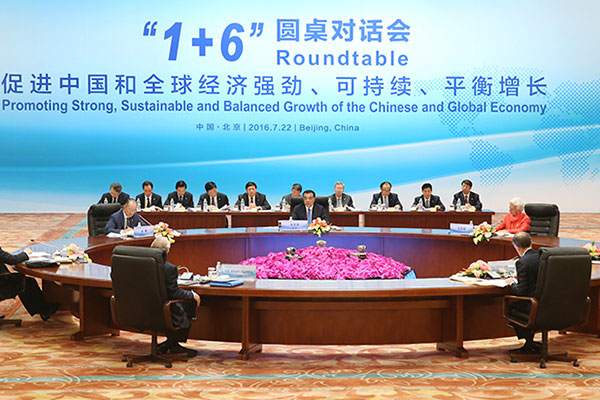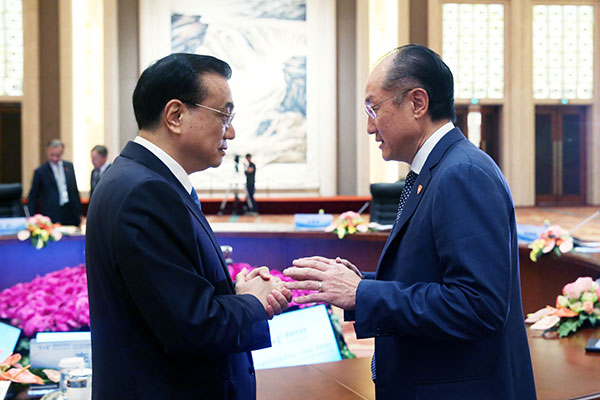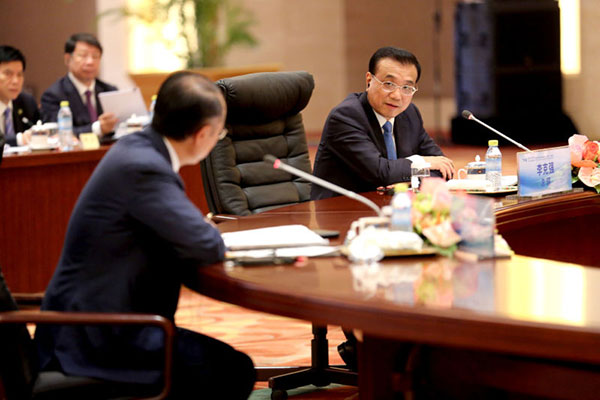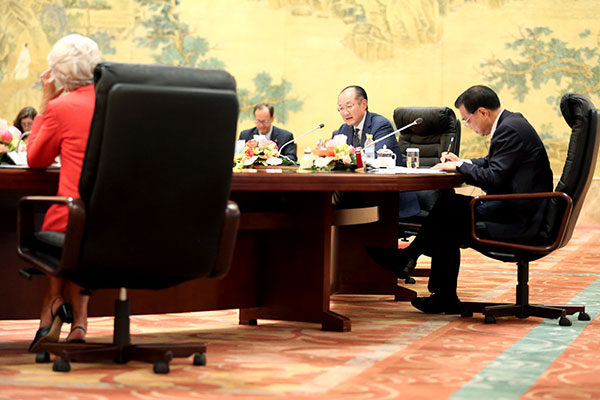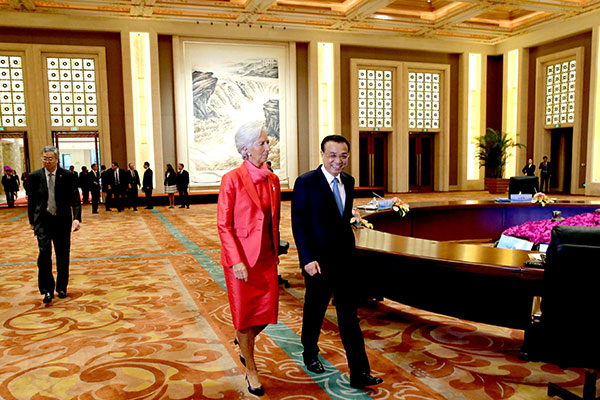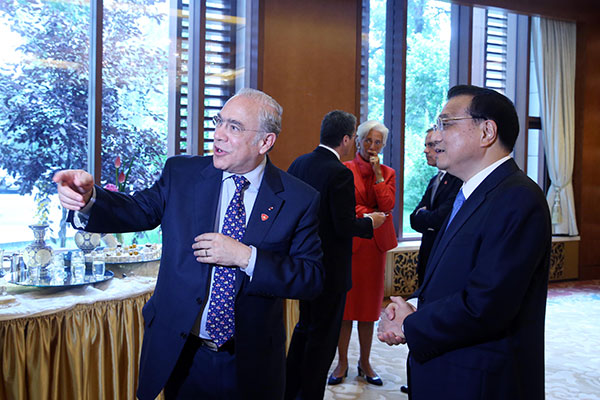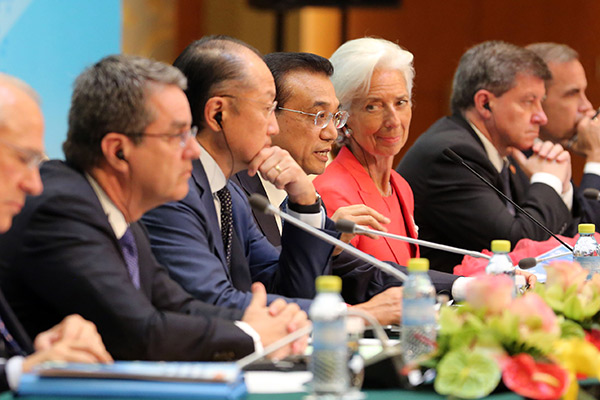It was the first time in history that Premier Li Keqiang and six international financial chiefs sat together and held a “1+6” roundtable.
The “1+6” meeting was held on July 22 in Beijing by Premier Li and Jim Yong Kim, president of the World Bank, Christine Lagarde, International Monetary Fund (IMF) managing director, Roberto Azevedo, director general of the World Trade Organization (WTO), Guy Ryder, director general of the International Labor Organization (ILO), Angel Gurria, secretary-general of the Organization for Economic Cooperation and Development (OECD), and Mark Carney, chairman of the Financial Stability Board (FSB).
Analysts said that China, as one of the major drivers of the world economy, would discuss with the international financial organizations the problems facing the world economy, including the sluggish economic recovery and Brexit.
According to The Paper, an emerging Chinese news website, Premier Li met with the leaders of major international organizations every year since he assumed office, but this was the first time he met with them all together.
In addition, it was the first time that Premier Li met with the chiefs of WTO, ILO and FSB as Premier.
In the past, Premier Li met with the president of the World Bank and IMF managing director nearly once a year. Their topics included innovation development, macro policy and financial reform. This time saw a broader agenda, which included economic development, structural reform, trade and employment.
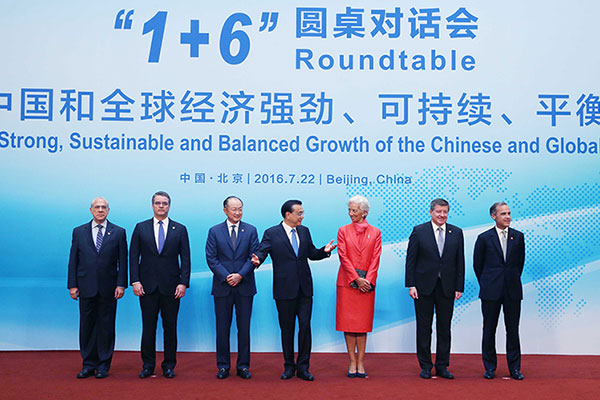
Multiple parties at roundtable
Premier Li’s roundtable with the six leaders on July 22 implies that China has an increasing impact on the global economy, and more “interconnectivity” is needed in global economy.
While meeting with World Bank President Jim Yong Kim in February, Premier Li pointed out that China has maintained a relatively fast economic growth through structural reform amid the sluggish growth of the world economy. He also said China will strengthen policy coordination with international society through platforms such as G20.
During a meeting with Christine Lagarde in March, Premier Li also expressed his willingness to cooperate and hold dialogues with international financial institutions such as IMF to put more effort into promoting a stable financial system on a global scale.
Wang Yuesheng, director of the School of Economics at Peking University, also stated China has now become one of the main powerhouses in the global economy. Therefore, although the sluggish growth around the world is caused by various factors, China can still play a key role in the recovery and future development. Under such circumstances, the six major institutes, including World Bank, IMF, and WTO, are urged to negotiate with China to cope with current global economic issues.
“Chinese economic measures exert considerable influence on the global economy, surpassing the American presidential election or Brexit. And the reason behind the roundtable is the world really wants to know China’s economic policy,” said Zhang Jun, dean of the School of Economics at Fudan University.
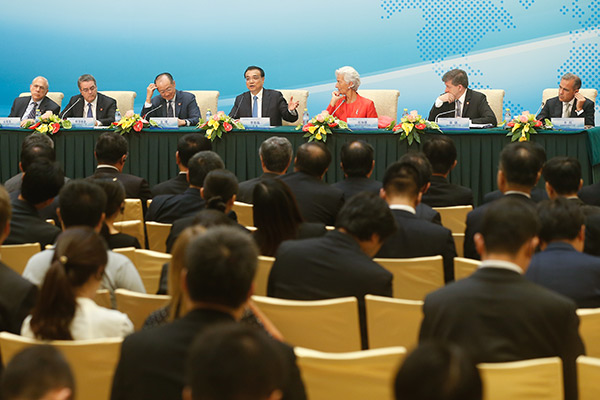
1+6 roundtable dialogue expected to become the norm
Premier Li exchanged views on economic growth, structural reform, trade, finance, development, employment and other topics with the heads of six major international organizations at the “1+6” roundtable dialogue.
“As one of the world’s major economies, China has an important influence on international economic policies, and it also has its own suggestions and ideas. These international economic organizations have a certain influence on economic policies of all countries. It is hoped that countries around the world do not implement protectionism, and promote free trade,” said Wang Yuesheng, adding that the roundtable topics covered nearly all problems in current international economic development.
Wang expected that there would be more such dialogues.
Zhang Jun noted that it was rare to see a national leader meet with the chiefs of six international organizations at the same time. And he believed that this pattern will likely become a normal mode of communication between China and the global market, creating a new mechanism and channel.
It is worth mentioning that it is less than two months between the Premier’s meeting with six international financial chiefs and the G20 summit to be held in Hangzhou.
China is making preparations for promoting the recovery of the global economy. Both the “1+6” roundtable and the G20 summit in Hangzhou are part of its efforts to coordinate with major economies on global economic policies, according to Wang’s analysis.
Zhang Jun said that at this stage, the Chinese government’s mechanism for communicating with the global investment and financial market is not as mature as the US Federal Reserves. And China hopes to indirectly communicate with the global investment and financial market through such meetings with the chiefs of international organizations, said Zhang.
